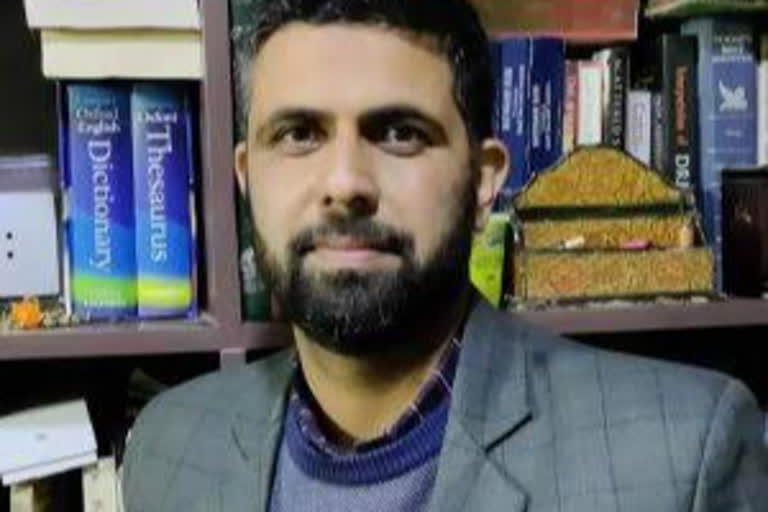Srinagar: India has ranked 150th in the World Press Freedom Index of 180 countries released by Reporters Without Borders on the occasion of World Journalism Day on May 3, 2022, which was 142nd last year. This gives an idea of how independent Indian journalism is! While the situation in Jammu and Kashmir has never been better for journalists, the situation has worsened after August 5, 2019.
In 2019, when the Union government abrogated the special status of Jammu and Kashmir, journalism here was the first to be affected. Internet and phone services were suspended due to which journalists could not contact their offices or send news on time. However, later a media centre was established by the administration and some facilities to transmit news were provided.
Local journalists said they feel intimidated by the restrictions imposed. They pointed out that the press club was not functional, many journalists were in jail and being harassed. Journalists are not even allowed to leave the country and Aakash Hassan who was denied a visit to Sri Lanka last month attest to this fact. "Journalists in Kashmir have been facing difficulties for a long time. But since 2019, the situation has worsened. It can be concluded from the Press Freedom Index where India's score is steadily falling. Our colleagues are harassed, cases are registered against them and some are even jailed," Hassan said.
"Journalists are beaten and prevented from performing their professional duties. Just as I was prevented from going to Sri Lanka where I was going to perform my professional duties. Similarly, Sanna Irshad Mattoo who won the Pulitzer Prize before me, were prevented from going abroad. Due to all this, fear is growing among journalists, their work is being affected and they cannot do their work independently. All this is an attack on the freedom of the press," he added.
Also read: Media must confine itself to honest journalism, not use influence to expand business: CJI Ramana
For a local journalist Zahoor Malik, "The situation is such that you are not able to do your job in an impartial manner. You cannot ask questions. If the administration says there was a gunfight, you have to say the same. Despite what your sources say. There are protests, but you cannot open your mouth against the administration."
"Public Safety Act has been imposed on many journalists, many have been detained for questioning in police stations. Many such cases have come to light after August 5, 2019. There has been a lot of impact on working methods. Journalists are not even allowed outside the country because the administration is afraid that the truth will come out," he said.
Interestingly, Asif Sultan, Peerzada Fahad Shah and Sajad Gul have been in jail for a long time now and cases have been registered against them under Public Safety Act and UAPA. Last year, four well-known journalists of the valley - Showkat Motta, Hilal Mir, Azhar Qadri and Shah Abbas - were summoned by the police in the Kashmir Fight Blog case, and all their electronic devices and other documents were confiscated. For several days, the investigation continued, but no arrests were made. Journalists see this move as creating fear in the community. "What happened? It was nothing but a way to scare us," a senior journalist said on the condition of anonymity.
Also read: Pulitzer Prize in Journalism, Books, Drama and Music announced
"After August 5, the life of journalists has changed a lot. The situation in Kashmir has become worse. There was a press club here where journalists used to discuss many issues, but not now. There is no press club and no library exclusively for the journalist community," Journalist Rati Sharma said.
"And if you talk about Kashmir, here you have to follow instructions and if you don't, you can lose your job. Even your channel can be banned. This is the situation in Kashmir," she added. Similar views were shared by other journalists Wasim Nabi, Haya Javed and Rashid Maqbool.
While Waseem expressed concern that he is always in the dilemma of "what to report and what not to report" because of fear, Haya said that "it is the job of a journalist to ask questions which in turn benefits the government. If there is any issue, it can be sorted only when the journalists bring it to light. Journalists cannot express their feelings. We request that no restrictions be placed on us to do our work and let us work impartially as we were before."
Rashid feels that "Journalism, in general, is also a challenging arena, in which journalists have to face several problems. I am not saying that there are no mistakes made by journalists, but there are institutions and laws to deal with them. There should be a mechanism between journalists and the administration to solve the problems of journalists." "For a strong democracy and to take the strides of development, it is necessary to make the press free," he added.


